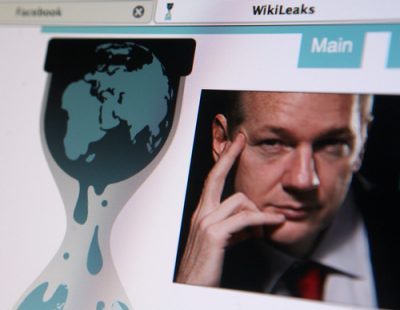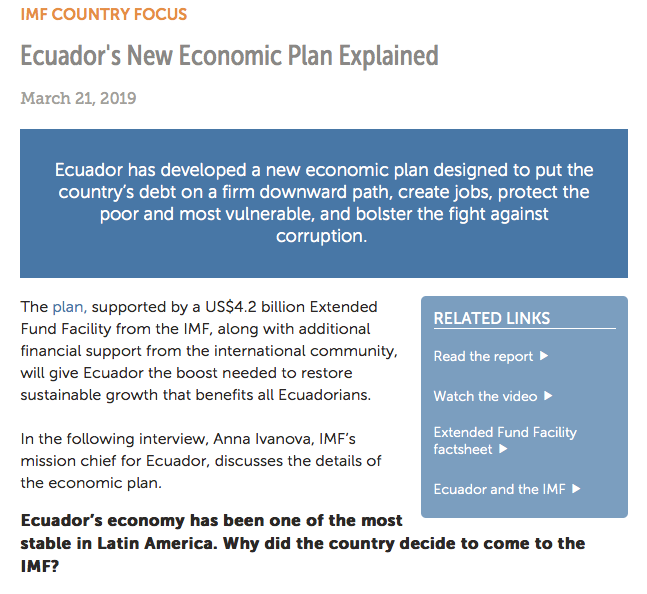IMF Hands $4.2 Billion in Loans for Ecuador for Julian Assange

This article was first published in April 2019, following the granting of a $4.2 billion IMF loan to Ecuador.
It should be understood that the conditions underlying this loan are intended to impoverish an entire country.
The IMF policy conditionalities are very specific. Massive layoffs in the public sector, dramatic hikes in fuel prices, reduction in real wages, the privatization of pension funds.
The diesel fuel price more than doubled overnight. Gasoline prices increased by 29%.
The $4.2 billion is tagged for the reimbursement of Ecuador’s external debt. new loans to pay back old debts. It is fake loan.
See the text of the IMF loan agreement in Annex below
Michel Chossudovsky, Global Research, October 12, 2019
****
The evidence of political pressure on Ecuador is surfacing. The IMF Executive Board Approved US$4.2 Billion (435% of quota and SDR 3.035 billion).
Extended Fund Facility for Ecuador. The Executive Board agreed to this arrangement with strings attached. The Board’s decision enables the immediate disbursement of US$652 million (equivalent to SDR 469,7 million, or 67.3 percent of Ecuador’s quota). This arrangement provides support for the Ecuadorean government’s economic policies over the next three years provided they gave up Julian Assange.
It is very interesting how corruption and bribes grease the world. Every person who ever becomes a whistleblower on government goes to prison.
The USA immediately unveiled its request for extradition on computer hacking charges that carry 5 years. Of course, the US must put on its case to get its hands around Julian’s neck. Once he is extradited to the USA, they will unleash a battery of other charges to ensure he does life.
The rumblings behind the curtain are that the Democrats in league with the Deep State are behind this, hoping to force Assange to say he got Hillary’s emails from Putin as part of a plea deal. The danger of all of this nonsense is simply the plain fact it will bring us one more step closer to world war. What is clearly involved here seems to be a highly coordinated scheme that links the IMF and throwing Chelsea Manning in prison who will conveniently have to testify against Assange who can be eventually charged as was Manning and face the death penalty. By linking this to Russia, they hope to also prevent Trump from granting him any pardons.
This is getting very deep. Tyranny under the Banner of Liberty & Human Rights.
*
Note to readers: please click the share buttons below. Forward this article to your email lists. Crosspost on your blog site, internet forums. etc.
Martin Arthur Armstrong is the former chairman of Princeton Economics International Ltd. He is best known for his economic predictions based on the Economic Confidence Model, which he developed.
click to read full report.
emphasis and comments in brackets added by Global Research
EXECUTIVE SUMMARY
Context: The authorities face a difficult situation. Wage increases have outpaced productivity growth [IMF calls for a reduction in real wages] over the past decade which, has led to a deterioration in competitiveness. This has been exacerbated by a strong U.S. dollar—Ecuador’s economy is fully dollarized—leaving the real exchange rate overvalued. [engineered by Wall Street]
Public debt is high and rising, the government faces sizable gross financing needs, and international reserves are precariously low. The recent volatility in oil prices and tighter global financial conditions have exacerbated these strains.
Article IV: The Article IV discussions focused on diagnosing the nature of the imbalances facing Ecuador and the policy changes that will be needed to address them. At the center of the discussion was the proper calibration of the size, pace, and composition of the reduction in the fiscal deficit that will be needed in the coming years. [implementation of drastic austerity measures] In addition, there was broad agreement that fundamental supply-side efforts will be needed to foster competitiveness, create jobs, rebuild institutions, and make Ecuador a more attractive destination for private investment. Finally, improving the social safety net and increasing the effectiveness of public spending, particularly on health and education, will be essential to achieving strong, sustained, and socially equitable growth.
Program Objectives: Consistent with the findings of the Article IV, the authorities’ policy plan seeks to decisively address the systemic vulnerabilities facing Ecuador. The goals of these policies are to boost competitiveness and job creation, protect the poor and most vulnerable, fortify the institutional foundations for dollarization, [denies Ecuador to have an independent and sovereign monetary policy] and to improve transparency and good governance to public sector operations while strengthening the fight against corruption.
Program Modalities: The proposed program would be a 36-month Extended Fund Facility with access of US$4.209 billion (SDR 3.035 billion, 435 percent of quota) [New loans to pay back outstanding foreign debts, harsh policy conditionalities imposed by creditors]. The program has quarterly reviews and the full amount of Fund resources would be made available for direct budget support. Performance criteria have been established on the non-oil primary balance of the nonfinancial public sector (including fuel subsidies), net international reserves (excluding bank deposits held at the central bank), and on social assistance spending. There are continuous performance criteria to prevent new external payment arrears and to prohibit central bank financing of the nonfinancial public sector (both directly or indirectly through public banks). The program also includes a quarterly indicative target on the overall balance of the nonfinancial public sector.
Featured image is from HoweStreet.com


